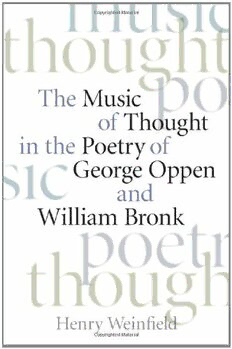
The Music of Thought in the Poetry of George Oppen and William Bronk PDF
253 Pages·2009·1.207 MB·English
Most books are stored in the elastic cloud where traffic is expensive. For this reason, we have a limit on daily download.
Preview The Music of Thought in the Poetry of George Oppen and William Bronk
Description:
George Oppen (1908–1984), born into a prosperous German Jewish family, began his career as a prot?g? of Ezra Pound and a member of the Objectivist circle of poets; he eventually broke with Pound and became a member of the Communist party before returning to poetry more than twenty-five years later. William Bronk (1918–1999), by contrast, a descendant of the first European families in New York, was influenced by the works of Shakespeare, the King James Bible, and the work of the New England writers of the American Renaissance. Despite differences in background and orientation, the two men formed a deep friendship and shared a similar existential outlook. As Henry Weinfield demonstrates in this searching and original study, Oppen and Bronk are extraordinary thinkers in poetry who struggled with central questions of meaning and value and whose thought acquires the resonance of music in their work. These major writers created poetry of enduring value that has exerted an increasing influence on younger generations of poets. From his careful readings of Oppen’s and Bronk’s poetry to his fascinating examination of the letters they exchanged, Weinfield provides important aesthetic, epistemological, and historical insights into their poetry and poetic careers. In bringing together for the first time the work of two of the most important poets of the postwar generation, The Music of Thought not only illuminates their poetry but also raises important questions about American literary history and the categories in terms of which it has generally been interpreted.
See more
The list of books you might like
Most books are stored in the elastic cloud where traffic is expensive. For this reason, we have a limit on daily download.
